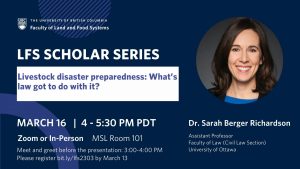Land and Food System Scholar Series
Invited scholar: Dr. Sarah Berger Richardson
Hosted by: Jennifer Black & Hannah Wittman, Integrated Studies in Land and Food Systems
Title: Livestock disaster preparedness: What’s law got to do with it?
Abstract: From floods and wildfires to hazardous materials spills and barn fires, every year hundreds of thousands of farm animals are killed in disasters. In 2021, it is estimated that two extreme weather events in British Columbia alone killed at least 1.3 million animals. For farmers and first responders, the experience of losing animals and witnessing them in distress can be traumatic. Moreover, the financial challenges associated with rebuilding after a disaster are numerous. Emergency preparedness in the agricultural sector requires careful planning and evacuation strategies to minimize and mitigate the effect of disasters on farm animals. In practice, however, this is often neglected. While non-governmental organizations such as the World Organisation for Animal Health recommend that animal housing facilities adopt emergency management programs, formal legal requirements to do so are uncommon. From both an animal welfare and a business perspective, more needs to be done so that livestock receive the necessary standard of care during emergencies. This presentation will explore some of the regulatory gaps that exempt farm buildings from practices that are required in other industries, as well as the potential role that non-governmental actors such as insurers can play to improve disaster preparedness in the agricultural sector.
Biography: Dr. Sarah Berger Richardson is an Assistant Professor at the Faculty of Law (Civil Law Section) of the University of Ottawa where she teaches food law and policy, administrative law, and civil liability. She is President and co-founder of the Canadian Association of Food Law and Policy as well as a member of the Law Society of Ontario. Her research focuses on the regulation of the agri-food sector, with a particular emphasis on animal agriculture and meat processing. She holds a Doctor of Civil Law from McGill University and completed her Masters of Law (LL.M) at Tel Aviv University, where she was a research fellow at the Manna Center in Food Safety and Security. In 2018-2019, she was a visiting teaching fellow at the Schulich School of Law at Dalhousie University. Previously, she served as a law clerk at the Supreme Court of Israel and the Canada Agricultural Review Tribunal.
Join in person or via Zoom:
Date: March 16, 2023
Time: 4:00-5:30 PM PDT
Location: In-person at MSL 101, or via Zoom
Meet and greet before the presentation: 3:00 – 4:00 PM, please register here by March 13.
